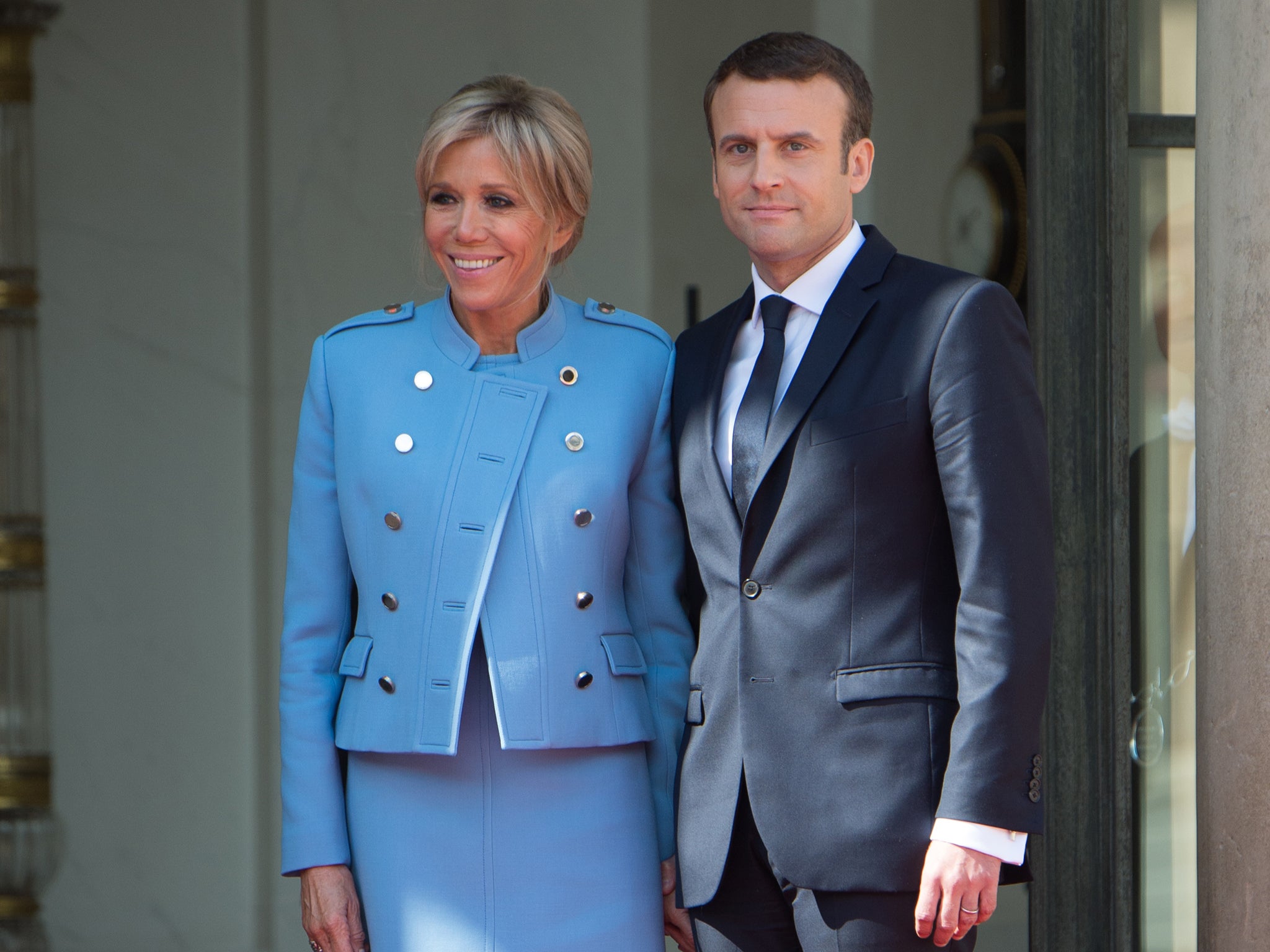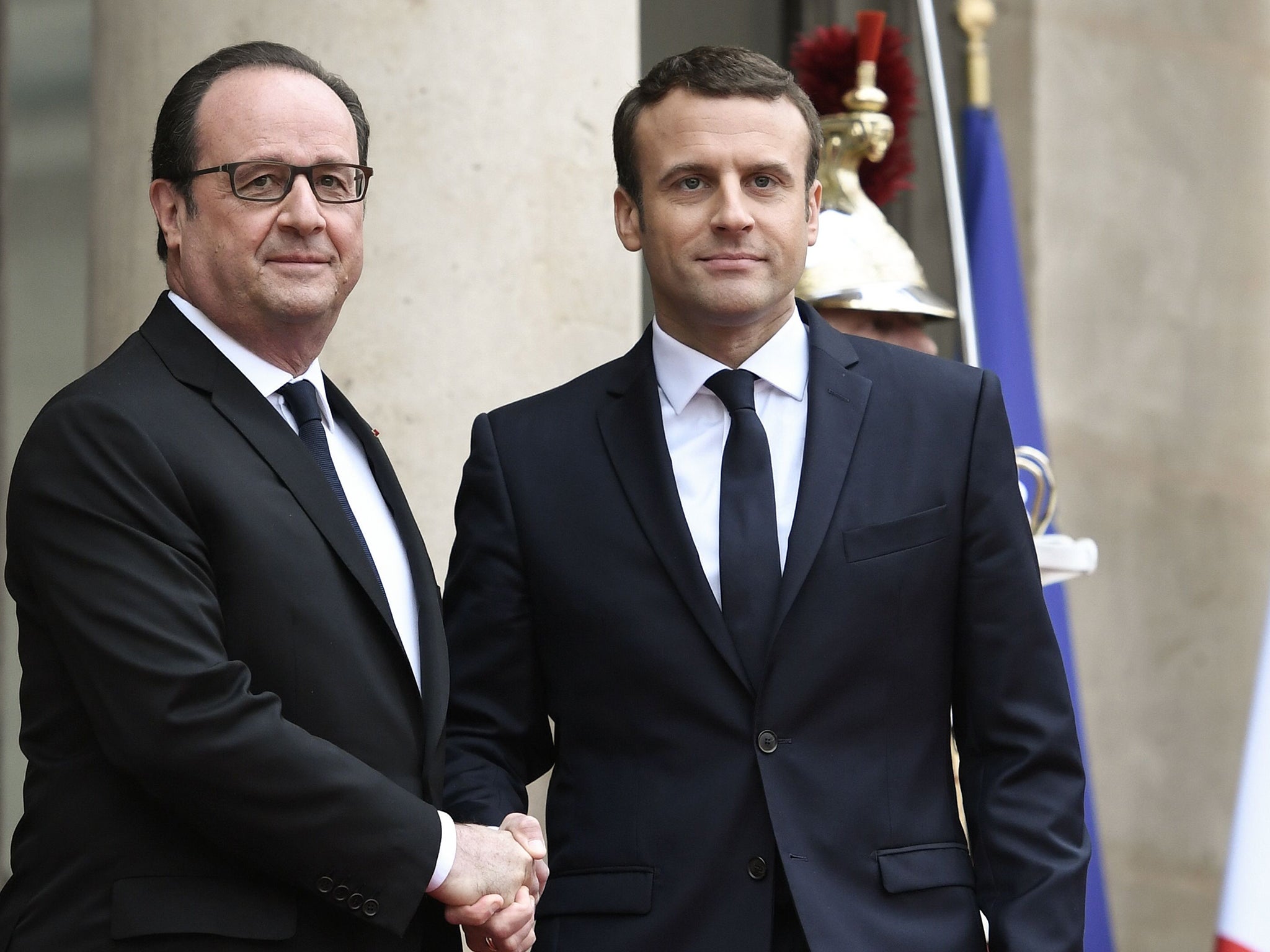Emmanuel Macron insists France is 'on the verge of a great renaissance' as he takes power
‘Nothing will make me stop defending the higher interests of France and for working to reconcile the French’

Your support helps us to tell the story
From reproductive rights to climate change to Big Tech, The Independent is on the ground when the story is developing. Whether it's investigating the financials of Elon Musk's pro-Trump PAC or producing our latest documentary, 'The A Word', which shines a light on the American women fighting for reproductive rights, we know how important it is to parse out the facts from the messaging.
At such a critical moment in US history, we need reporters on the ground. Your donation allows us to keep sending journalists to speak to both sides of the story.
The Independent is trusted by Americans across the entire political spectrum. And unlike many other quality news outlets, we choose not to lock Americans out of our reporting and analysis with paywalls. We believe quality journalism should be available to everyone, paid for by those who can afford it.
Your support makes all the difference.Pro-Europe centrist Emmanuel Macron has said France is “on the verge of a great renaissance” as he became President in a solemn Élysée Palace ceremony.
Mr Macron vowed to work to heal divisions in society – a nod to the bitter campaign he fought to defeat far-right leader Marine Le Pen.
His inauguration marked a first for the world’s fifth largest economy and founding member of the European Union, installing a 39-year-old newcomer unknown to the wider public three years ago and outside any traditional political grouping.

The former investment banker becomes the youngest post-war French leader and the first to be born after 1958 when President Charles de Gaulle put in place the country’s Fifth Republic.
In his first word in office, he addressed himself to the fraught and fiercely contested election campaign in which he overcame the National Front’s Ms Le Pen but which was a disappointment for almost half of France’s 47 million voters.
Many people feel dispossessed by globalisation as manufacturing jobs move abroad and as immigration and a fast-changing world blur their sense of a French identity.
“The division and fractures in our society must be overcome. I know that the French expect much from me. Nothing will make me stop defending the higher interests of France and for working to reconcile the French,” Mr Macron declared.
A convinced European integrationist unlike Ms Le Pen and other leadership candidates, Mr Macron went on: “The world and Europe need more than ever France, and a strong France, which speaks out loudly for freedom and solidarity.”
He will launch his bid for closer ties with EU anchor nation Germany at talks with Chancellor Angela Merkel on Monday in Berlin, where he will ram home the message that the bloc is resilient despite Britain’s “Brexit” vote and a spate of financial and migration crises that has boosted the far right.
On Monday, Mr Macron is to name his prime minister, whose job will be to pilot the president’s liberalising reforms aimed at reducing high unemployment and reviving the sluggish economy.
The rise of Mr Macron, which was marked by a 21-gun salute at the Esplanade des Invalides behind the Eiffel Tower, signalled at least a pause in the anti-globalisation trend that elevated businessman Donald Trump into the US presidency and led British voters to choose a future outside the European Union.
Mr Macron assumed power after an hour-long private meeting with outgoing President François Hollande in which official access to France’s nuclear missile launch codes was handed over.
Mr Macron then accompanied his political patron, for whom he once worked as economy minister, down the red carpet to a waiting car in which the Socialist leader departed to applause from VIP guests and his former household staff.
In a ceremony conducted with all the pomp and glitter of high state occasions in France, Mr Macron was presented with what is effectively his chain of office – a heavy golden necklace mounted on a red cushion that makes him Grand Master of the National Order of the Légion d’Honneur – an honours system for servants of the Republic.
But he also appeared determined to create an impression of personal modesty at the start of his rule.

Aides went out of their way to emphasise that the dark suit he wore to stride up the red carpet to power cost about €450, or just under £400. The Vuitton lavender blue costume worn by his wife Brigitte, who was at his side, was on loan from the fashion house, journalists were told.
But he also displayed youthful vigour and hardiness during the televised proceedings. At one point, he raced up the Élysée stairs to meet a protocol requirement, something not all previous French presidents might have managed.
Later, departing from tradition, he chose to be driven by military jeep rather than civilian limousine up to the Arc de Triomphe where he stood in a downpour, without raincoat or umbrella, to light the flame in tribute to France’s war dead at the Tomb of the Unknown Soldier – a powerful reminder of France’s role in the Nato defence alliance.
A visit to French troops in Mali planned for next Friday was a strong symbol of his commitment to pursue France’s military and peacekeeping role in the Middle East and Africa.
Mr Macron showed determination too in the fight against terrorism by shaking hands with well-wishers on the Champs-Élysées, not far from where a policeman was shot dead by a gunman acting for Isis shortly before the 7 May second round of the election.
More than 230 people have died in attacks claimed by Isis in France over the past two years as the country has taken part in military action against the militant group that controls parts of Syria and Iraq.
Some 1,500 police were mobilised to ensure security for Mr Macron’s inauguration, while a large section of Paris was closed to traffic all morning.

In coming parliamentary elections in June he must try to win a majority for his start-up Republic on the Move (REM) party that has blown apart traditional French political boundaries.
Mr Macron, who rose to prominence as Mr Hollande’s economy minister between 2014 and 2016, might therefore struggle to get the country behind him.
In the first round of voting, more than 45 per cent chose either Ms Le Pen or other candidates who promised the opposite of Mr Macron’s medicine – that they would close the wealth gap by rolling back globalisation, closing borders and unravelling the institutions of the European Union.
The business-friendly labour reforms in Mr Macron’s programme will push on with an effort Mr Hollande started and which killed his chances of a second term by failing to ease unemployment. They helped make Mr Hollande the least popular French president in modern history.
But the timing of France’s youthful new leader is good – the economy, in the doldrums for years, is beginning to show signs of recovery.
Union power has waned in the Hollande years, even though workers rights are still held dear. And until a financial scandal ruined his campaign at the start of this year, Mr Macron’s mainstream conservative rival François Fillon had won wide electoral support for a far more aggressive set of pro-business measures.
Reuters
Join our commenting forum
Join thought-provoking conversations, follow other Independent readers and see their replies
Comments